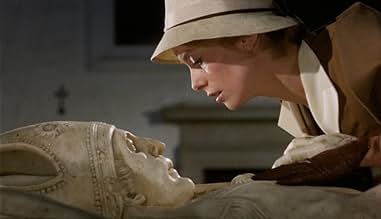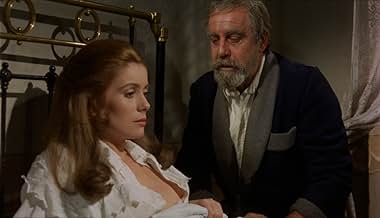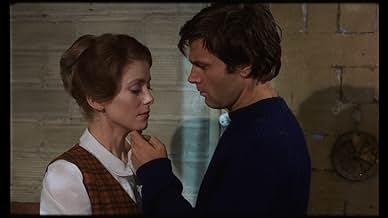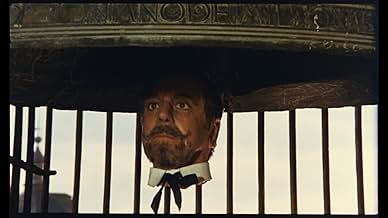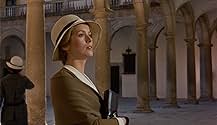Tristana
- 1970
- Tous publics
- 1h 39min
Peu de temps après la mort de sa mère, une femme jeune et innocente trouve refuge dans la maison de son tuteur, un aristocrate d'âge moyen.Peu de temps après la mort de sa mère, une femme jeune et innocente trouve refuge dans la maison de son tuteur, un aristocrate d'âge moyen.Peu de temps après la mort de sa mère, une femme jeune et innocente trouve refuge dans la maison de son tuteur, un aristocrate d'âge moyen.
- Réalisation
- Scénario
- Casting principal
- Nommé pour 1 Oscar
- 11 victoires et 4 nominations au total
- Muchacha
- (as María Paz Pondal)
- Don Cándido
- (as Juan José Menéndez)
Avis à la une
"Tristana" contains many of the common factors of Buñuel's movies: his total contempt for the ruling sectors of society and the rich people, for hypocrisy and Puritanism; his irreverence, and a wicked and implicit sexual content. Only the man who made "Belle de Jour" would dare to amputate a leg to the goddess Deneuve (one of the most beautiful creatures that ever walked the earth). Fernando Rey plays a typical Spanish "hidalgo" that's come down in the world and that sexually harass his stepdaughter.
So, Buñuel not only hadn't lost his touch with the years, on the contrary, he felt more and more free as the time went by to let his genius flow *My rate: 8/10
Tristana, played brilliantly by Catherine Denueve, is the central character whom we see evolve from an innocent young girl with her many ideals about love and relationship, to a bitter and cynical woman at the film's end who cannot believe in anything any longer. It is with special finesse that Deneuve plays her, that we witness, with heartbreak, every turn of her back on the things she love, and every rejection of all morality that she held before.
Fernando Rey's character is probably the murkiest but ultimately most empathetic character, as at the end of the film, age wears off his hard-edged cynicism and turns him into the loving father figure that Tristana desperately needed in the beginning of the film. In a sense, it is a film about age, how when we reach a certain point in our lives we see things much clearer and as it is, rather than try to twist things to our advantage. The way Rey's character treasures the time with the vile and vindictive Tristana at the end of the film is not only overwhelmingly sad, but also an epiphany by an auteur who is gaining age himself.
In spite of all its dramatic turns of events, Tristana is not an emotional and angsty film in its portrayal of its characters' lives. Instead it is a soft and peaceful film that sympathetically accepts its characters' flaws as much as it forgives them. It is a film that evokes the intricate feeling of looking back in our dark and troubled past and finding the exquisite moments of happiness amidst all the cynicism and grit. When, towards the end, Rey reaches the peace that he has been struggling so hard to attain throughout the film, he notes, 'It's snowing so hard outside, but in this house, I'm nice and warm. What's there not to be happy about?'. A silent recognition that peace is not bending reality to your own will, but merely, acceptance.
When Tristana meets the painter Horacio (Franco Nero), they fall in love with each other and Tristana flees from Don Lope. However, years later, Horacio brings Tristana back to Don Lope with a terminal disease on her leg. She has a severed leg and survives, and Don Lope asks her hand in marriage. She accepts but now Tristana is a bitter and cynical woman and Don Lope feels the consequence of his acts in the past.
"Tristana" is a morbid tale of lost of innocence by Luis Buñuel. I had seen this film for the last time on 05 Feb 2003 and despite the wonderful performances of Catherine Deneuve and Fernando Rey, it is not among my favorite Buñuel's films. As usual, the director criticizes the Church and the bourgeois class but his famous surrealism is only presented in Tristana's nightmare. My vote is seven.
Title (Brazil): "Tristana"
7/10
Le saviez-vous
- AnecdotesLuis Buñuel said that many of Tristana's idiosyncrasies, including her habit of asking people to choose between nearly identical objects, was based on the director's sister's similar habits.
- Citations
Don Lope: Poor workers. Cheated and then beaten. Work is a curse, Saturno. Down with work that you have to do to survive. That work isn't honorable, as some say. All it does is fatten the exploiting swine. However, what you do for pleasure ennobles man. If only we could all work like that. Look at me, I'd rather be hanged than work! So, I live poorly, but I live without working.
- Versions alternativesOriginally released in Europe at 105 minutes.
- Bandes originalesÉtude No 12 in C minor, Op 10 'Revolutionary'
Written by Frédéric Chopin
Meilleurs choix
- How long is Tristana?Alimenté par Alexa
Détails
- Date de sortie
- Pays d’origine
- Site officiel
- Langue
- Aussi connu sous le nom de
- Mảnh Đời Của Tristana
- Lieux de tournage
- Paseo Recaredo, Toledo, Castilla-La Mancha, Espagne(opening and closing scenes with Saturna, Viridiana and the mute boy)
- Sociétés de production
- Voir plus de crédits d'entreprise sur IMDbPro
Box-office
- Montant brut aux États-Unis et au Canada
- 14 586 $US
- Week-end de sortie aux États-Unis et au Canada
- 4 754 $US
- 14 oct. 2012
- Montant brut mondial
- 14 586 $US
- Durée
- 1h 39min(99 min)
- Mixage
- Rapport de forme
- 1.66 : 1


